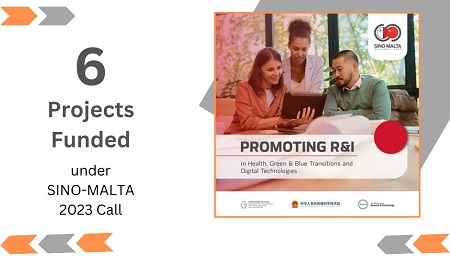
Register with Plumtri!
Register on plumtri as an Individual or as an Organisation to gain access to all of its useful features and remain updated on the latest R&I news, events and funding opportunities.
-
 Welcome to plumtriA platform for Research & Innovation
Welcome to plumtriA platform for Research & Innovation -
 Looking for Funding?Check out the current open calls
Looking for Funding?Check out the current open calls -
 Register today to start receiving our monthly newsletter
Register today to start receiving our monthly newsletter -
 Looking to partner up?Search our list of registered profiles
Looking to partner up?Search our list of registered profiles -
 You have questions on a particular funding programme?
You have questions on a particular funding programme?
6 Projects Funded under the SINO-MALTA 2023 Call: Strengthening Malta’s R&I Ecosystem through International Cooperation with China

The SINO-MALTA fund originated from an initial agreement between the Government of Malta and the Government of the People's Republic of China in the realm of Science and Technological Cooperation which later, through the work of the Joint Committee for the cooperation, developed into the Fund that is managed by the Malta Council for Science and Technology (MCST) and the Ministry of Science and Technology (MOST) in China.
The 2023 Call for Proposals of the Fund marked a significant milestone, representing the 5th iteration of the Fund, which was commemorated by an expansion of the Fund’s budget, resulting in the funding of six projects, with approximately EUR 1,200,000 in funds from the Maltese side that was matched by the Chinese side, within the areas of Health, Digital Technologies and the Blue and Green Economy Transitions.
As a result of the SINO-MALTA Fund 2023 Call, the following projects received support through local funding for research projects.
Decarbonization of Ports using microgrid technologies with shore and offshore power (DISTRICT) is a project being coordinated by Professor Alexander Micallef from the University of Malta and Professor Xaio Zhao-xia from Tiangong University within the Green & Blue Economic Transitions thematic area. Over the course of 24 months, the project aims to contribute to the green transition of ports by developing strategies to decarbonize the present and future port activities. The activities in DISTRICT are focused on two fronts: (1) Port microgrids shall be designed to support port onshore activities including green shore power for berthed ships. (2) Offshore stations powered from renewable energy sources shall be designed to supply ships that are anchored off the coast waiting to unload and to support the shore microgrid with renewable energy.
Hybrid Energy Storage System (HESS) is a project being coordinated by Dr. Ing. John Licari from the University of Malta & Professor Qingqing Yang (Beijing Institute of Technology) within the Green & Blue Economic Transitions thematic area. The contribution of the project HESS is towards the green transition of land transportation by developing an Energy Hub Microgrid concept with the aim of maximizing the exploitation of green energy. The strategic activities will be the following: minimizing green energy curtailment by providing local energy storage, provision of an optimized hybrid energy storage solution considering power and energy densities to cater for renewable energy generation intermittency, and generation of an alternative fuel for land transportation from any surplus energy generated that can be used both on site or transported to another locations.
High Relaibilty & High Power Density Starter/Generator System for MEA (SG Drive) is a project being coordinated by Prof. Ing. Michael Galea from the University of Malta, Dr. Xiaochen Zhang from Yongjiang Laboratory & Prof. Jing Li from the University of Nottingham Ningbo China coordinating a project within the Green and Blue Economy Transitions thematic area. With global air transport increasing by about 2 - 4 times within the next two decades, pollution emissions are a huge challenge for the aviation industry. Aviation electrification technology can replace 70% of the current energy generation, distribution and consumption in the traditional secondary energy system. The SGdrive project aims to develop highly innovative starter-generator systems for the More Electric Aircraft (MEA) through collaborative research, collectively supported by China MOST and Malta MCST. The overarching aim is to develop an ultra-high power density system which is 1) modular, 2) highly reliable and 3) seamlessly vehicle integrated. From the University of Malta’s perspective, the focus will be on the integration and the reliability aspects of the starter-generator.
Theory and Key Technologies for Al Driven 6G Broadband Communication Systems (TEKAID6G) is a project being coordinated by Prof. Ing. Saviour Zammit from the University of Malta, Ing. Antoine Sciberras from the Malta Communications Authority and Prof. Ying Yang from China University of Electronic Science and Technology (UESTC) within the Digital Technologies Thematic Area. The TEKAID6G project, a collaborative effort between UESTC and the University of Malta, funded by the SINO-Malta research fund, focuses on advancing 6G network technologies over a two-year period. UESTC aims to enhance 6G networks' capacity, latency, and reliability through AI-driven resource allocation and air interface transmission optimization, using multidimensional data analysis, intelligent algorithms, and integration of AI with 6G design. The University of Malta's contribution centers on sustainability, developing methodologies for monitoring energy efficiency in 5G-Advanced and 6G systems. This includes studying the impact of regulatory policies and creating the EDGEAILE platform to demonstrate energy-efficient applications and provide a training and research platform for future engineers, with an open-source approach for broader use.
Digital Health Inspection of Concrete Bridge Structures in Coastal Areas with Wall-Climbing Robot and Computer Vision (DiHICS) is a project being coordinated by Prof. Carl James Debono from the University of Malta & Prof. Jiangpeng Shu from the Zhejiang University within the Digital Technologies Thematic Area. Concrete infrastructure including bridge structures in coastal areas can experience faster deterioration posing a threat to the users of the infrastructure. In order to ensure safety, such infrastructures need to be periodically inspected for defects and more importantly their changes from previous inspections. This process is labor intensive and normally requires the closure of the infrastructure during these inspections. Therefore, digital automated techniques are desirable to reduce inspection times, avoid infrastructure closures, and reduce safety risks to inspection personnel. Wall climbing robots provide a possible solution to automate the capture of imagery of the concrete structure. This data is then processed and analyzed using computer vision and machine learning techniques to understand if there are new defects or if there are any changes to previously identified defects, such as cracks. The output is then mapped to a virtual reality environment through which surveyors can inspect the health of the infrastructure and evaluate risks.
Enhancing Speech Imagery Decoding for EEG-based Brain-Computer Interface Systems (SiDEC) is a project being coordinated by Prof.Kenneth Camilleri from the University of Malta & Prof.Yong Peng from the Hangzhou Dianzi University under the Digital Technologies Thematic Area. Speech imagery (SI) is a brain-computer interface (BCI) paradigm which can enable subjects to intuitively control external devices by thinking of words. However, the widespread use of the SI paradigm has been impeded by the relatively low decoding accuracies obtained when using electroencephalogram (EEG) data, which is a leading non-invasive method of reading brain signals. This project aims to investigate novel and innovative signal processing, machine learning, and deep learning techniques to improve the accuracy of SI decoding and investigate fundamental aspects of SI, such as the impact of background noise on data quality and detection rate variation as the lexicon increases. This project aims to make significant contributions towards the improved decoding of SI data from EEG data, which is fundamental for the widespread adoption of practical SI-based BCIs.
Currently MCST and MOST are in the process of launching the next Call for R&I proposals in quarter two of this year, which will be the 6th iteration of the Fund. A budget of €1,200,000 is being allocated to this rapidly growing programme, for R&I proposals addressing the following thematic areas: Health, Green & Blue Transitions and Digital Technologies. Malta-based entities within a project proposal can be funded up to €200,000. Contact MCST through international.mcst@gov.mt for more information on the SINO-MALTA Fund.

